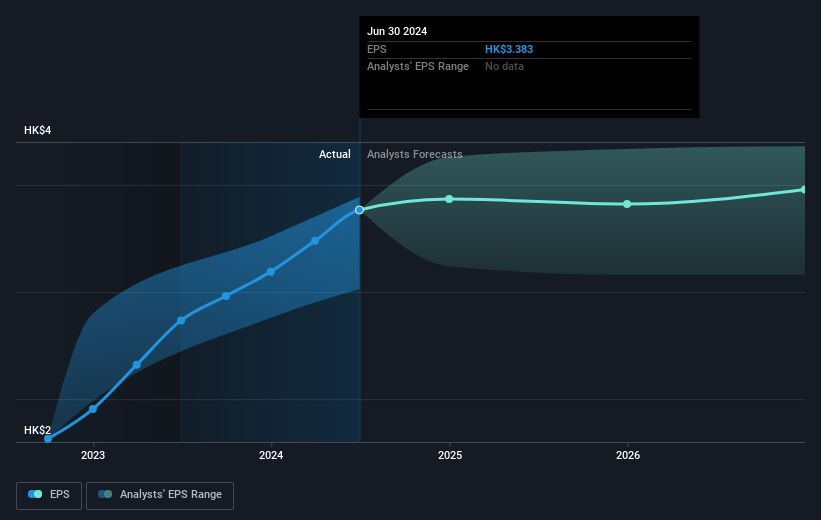BOC Hong Kong (Holdings)'s (HKG:2388) investors will be pleased with their respectable 31% return over the last year

Diversification is a key tool for dealing with stock price volatility. Of course, the aim of the game is to pick stocks that do better than an index fund. One such company is BOC Hong Kong (Holdings) Limited (HKG:2388), which saw its share price increase 22% in the last year, slightly above the market return of around 18% (not including dividends). Having said that, the longer term returns aren't so impressive, with stock gaining just 1.6% in three years.
With that in mind, it's worth seeing if the company's underlying fundamentals have been the driver of long term performance, or if there are some discrepancies.
Check out our latest analysis for BOC Hong Kong (Holdings)
To paraphrase Benjamin Graham: Over the short term the market is a voting machine, but over the long term it's a weighing machine. One way to examine how market sentiment has changed over time is to look at the interaction between a company's share price and its earnings per share (EPS).
BOC Hong Kong (Holdings) was able to grow EPS by 18% in the last twelve months. This EPS growth is reasonably close to the 22% increase in the share price. So this implies that investor expectations of the company have remained pretty steady. It makes intuitive sense that the share price and EPS would grow at similar rates.
The company's earnings per share (over time) is depicted in the image below (click to see the exact numbers).

We know that BOC Hong Kong (Holdings) has improved its bottom line lately, but is it going to grow revenue? You could check out this free report showing analyst revenue forecasts.
What About Dividends?
When looking at investment returns, it is important to consider the difference between total shareholder return (TSR) and share price return. The TSR is a return calculation that accounts for the value of cash dividends (assuming that any dividend received was reinvested) and the calculated value of any discounted capital raisings and spin-offs. It's fair to say that the TSR gives a more complete picture for stocks that pay a dividend. In the case of BOC Hong Kong (Holdings), it has a TSR of 31% for the last 1 year. That exceeds its share price return that we previously mentioned. And there's no prize for guessing that the dividend payments largely explain the divergence!
A Different Perspective
It's nice to see that BOC Hong Kong (Holdings) shareholders have received a total shareholder return of 31% over the last year. And that does include the dividend. Since the one-year TSR is better than the five-year TSR (the latter coming in at 4% per year), it would seem that the stock's performance has improved in recent times. Given the share price momentum remains strong, it might be worth taking a closer look at the stock, lest you miss an opportunity. While it is well worth considering the different impacts that market conditions can have on the share price, there are other factors that are even more important. For instance, we've identified 1 warning sign for BOC Hong Kong (Holdings) that you should be aware of.
We will like BOC Hong Kong (Holdings) better if we see some big insider buys. While we wait, check out this free list of undervalued stocks (mostly small caps) with considerable, recent, insider buying.
Please note, the market returns quoted in this article reflect the market weighted average returns of stocks that currently trade on Hong Kong exchanges.
Valuation is complex, but we're here to simplify it.
Discover if BOC Hong Kong (Holdings) might be undervalued or overvalued with our detailed analysis, featuring fair value estimates, potential risks, dividends, insider trades, and its financial condition.
Access Free AnalysisHave feedback on this article? Concerned about the content? Get in touch with us directly. Alternatively, email editorial-team (at) simplywallst.com.
This article by Simply Wall St is general in nature. We provide commentary based on historical data and analyst forecasts only using an unbiased methodology and our articles are not intended to be financial advice. It does not constitute a recommendation to buy or sell any stock, and does not take account of your objectives, or your financial situation. We aim to bring you long-term focused analysis driven by fundamental data. Note that our analysis may not factor in the latest price-sensitive company announcements or qualitative material. Simply Wall St has no position in any stocks mentioned.
About SEHK:2388
BOC Hong Kong (Holdings)
An investment holding company, provides banking and related financial services to corporate and individual customers in Hong Kong, China, and internationally.
Solid track record with excellent balance sheet and pays a dividend.
Market Insights
Community Narratives


